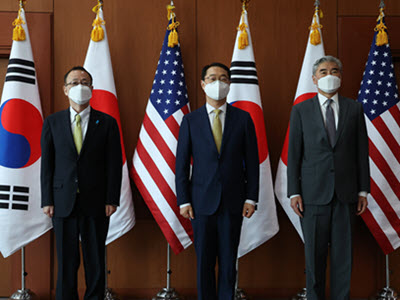U.S.-Japan-ROK Trilateral Cooperation
An Opportunity for Renewal
This commentary by Evans J.R. Revere is part of the roundtable “The Future of Trilateralism under the Biden-Yoon-Kishida Administrations.”
For the United States to preserve peace and stability in Northeast Asia, it is axiomatic that Washington must ensure the closest possible coordination and cooperation with its Northeast Asian allies—Japan and the Republic of Korea (ROK). Today, U.S. ties with each of these allies are stronger than ever. But a growing North Korean nuclear threat and a more aggressive China have complicated security dynamics in Northeast Asia, making the task of maintaining peace and stability much more difficult. In the absence of strong trilateral security cooperation among Washington, Tokyo, and Seoul, the U.S.-centric security system in the region may not be up to the task of managing new and emerging threats effectively.
North Korea is now a de facto nuclear weapons state, and prospects for denuclearization have disappeared. China, North Korea’s sole treaty ally, has greatly strengthened its ties with Pyongyang and is exploiting the regime’s knack for keeping the United States and its allies off balance. Meanwhile, Pyongyang appears eager to join what in all but name is an alliance between Beijing and Moscow.
Faced with this new reality, the time has come for the United States and its two regional partners to enhance trilateral cooperation, including in the military and intelligence spheres, to meet the challenge. Put another way, it is imperative that Washington replace the current “parallel alliance” system and move toward a trilateral mechanism better suited to managing the evolving threats that all three countries are facing.
The main obstacles to such cooperation lie in Tokyo and Seoul because of the mistrust, suspicion, and bitterness that have characterized their ties in recent years. The causes of this antagonism are well known. On the South Korean side, there are memories of Japan’s past invasions and brutal colonial occupation of Korea, fear of a resurgence of Japanese militarism, and a belief that past apologies have been “insincere,” among other grievances. Japan, for its part, has accused South Korea of continually moving the goalposts for resolving the historical issues between the countries.
But a window of opportunity is now opening that could enable the two sides to increase goodwill and establish (or re-establish) cooperative mechanisms bilaterally as well as trilaterally with the United States. While it is still early, there are signs that new leaders in Seoul and Tokyo recognize that the time has come to better manage their history and try to move beyond the issues that have divided them.
South Korea’s new president, Yoon Suk-yeol, has made clear his wish to erase the mistrust created by his predecessor, whose conciliatory approach toward North Korea dismayed Tokyo. Japanese prime minister Fumio Kishida’s victory in the July 10 Upper House election has given his ruling coalition a strong mandate, possibly enabling him to engage in ice-breaking diplomacy with Seoul. Former prime minister Shinzo Abe’s tragic death has removed from the scene a key actor known for his antipathy toward South Korea. And President Yoon has put the alliance with the United States, closer defense cooperation with Washington, and a more vigilant posture toward North Korea at the center of his foreign and national security policies. These steps have gone down well in Tokyo.
The United States should take advantage of this situation by creating opportunities for quiet, senior-level trilateral dialogues on regional security challenges, beginning with the threat from North Korea. Washington should urge Seoul and Tokyo to bring defense officials, including uniformed military officers, to these discussions. Early on, enhanced intelligence and information exchanges, table-top exercises with North Korea–related scenarios, and eventual trilateral air and naval exercises should be discussed (though ground exercises are likely to remain highly problematic for now). There is precedent for such trilateral dialogue and cooperation, including through military exercises, so this will not be a matter of reinventing the wheel.
The U.S. Congress has a key role to play in this effort. To begin with, it should hold hearings that highlight the benefits of U.S.-Japan-ROK trilateral security cooperation. A key point to be made in such hearings is that such cooperation is essential for the United States to fulfill its defense commitments to each of its allies.
Congress should also convene regular trilateral consultations between members and their counterparts in Japan’s Diet and South Korea’s National Assembly to discuss security and economic cooperation. Such meetings, held on a rotating basis among the three capitals, could build common purpose, enhance transparency, and, if managed well, break down the barriers that currently hinder dialogue and cooperation between Japan and the ROK.
North Korea and China are challenging the United States, South Korea, and Japan in new and troubling ways. The three countries should use this challenge to take their relationship to a new, closer, and more effective level.
Evans J.R. Revere retired from the Foreign Service in 2007 after a distinguished career as one of the U.S. Department of State’s top Asia experts. He served as the principal deputy assistant secretary and acting assistant secretary of state for East Asian and Pacific Affairs, and deputy chief of mission and charge d’affaires of the U.S. Embassy in Seoul. He also served in China, Taiwan, and Japan and has extensive negotiating experience with North Korean officials. Mr. Revere was president and CEO of the Korea Society from 2007 to 2010.



